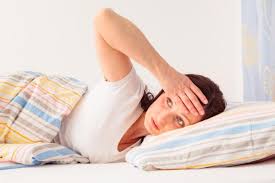Do you often wonder why your bed and clothes are soaked in sweat when you wake up in the morning? What could be the possible explanation for this problem? Well, you may be suffering from a condition called sleep hyperhidrosis or simply night sweats. If you have this condition, you may wake up in the middle of the night feeling extremely clammy or hot with excessive sweat. It can be quite annoying since it can interfere with your sleep quality and may as well lead to issues such as stress and insomnia. Waking up drenched in sweat is a condition usually associated with hormonal changes but it may also indicate a serious underlying problem. What causes night sweats and how you can improve your condition? Let's find out now!

Why Do You Wake Up Drenched in Sweat?
So many factors can contribute to this condition. Certain lifestyle changes may also make you wake up drenched in sweat. Here are some possible explanations to this problem.
1. Menopause or Andropause
You may be experiencing sweating problem due to hot flashes associated with the menopausal transition. These flashes can occur at night and cause sweating as well. Most men do not know this but they can also go through the same phase called andropause – it usually affects 5% of the male population. It is the outcome of gradual decrease in testosterone levels.
2. Idiopathic Hyperhidrosis
You may be sweating too much just because you have a condition called idiopathic hyperhidrosis in which your body produces excessive sweat without any particular medical cause.
3. Infections
Waking up drenched in sweat may sometimes indicate a serious infection such as tuberculosis. Similarly, bacterial infections that cause osteomyelitis (inflammation of the bones), endocarditis (inflammation of the heart valves), and abscesses may also lead to night sweats. Night sweats may also indicate HIV/AIDS in some cases.
4. Cancers
You may experience night sweats when you have a specific type of cancer, such as lymphoma. People with leukemia may also experience night sweats. If your night sweats are due to cancer, you may have other symptoms as well, such as fevers and unexplained weight loss.
5. Medications
You may experience night sweats as a side effect of different medications. Antidepressants are the most common culprits. The same is the case with psychiatric drugs. Acetaminophen, aspirin, or medicines taken to lower fever may cause excessive sweating. Other drugs such as tamoxifen, niacin, nitroglycerine, hydralazine, and other cortisone medications can cause flushing.
6. Hypoglycemia
Hypoglycemia is a condition in which your blood sugar levels stay low all the time. So many times, low blood sugar leads to sweating. You may experience night sweats if you are on insulin or oral anti-diabetic medications that lower your blood glucose level.
7. Hormone Disorders
So many hormonal disorders such as carcinoid syndrome, pheochromocytoma, and hyperthyroidism may also cause flushing or sweating. You will experience hormonal changes during pregnancy and experience sweating. Premenstrual syndrome also causes hormonal imbalance and lead to sweating. Diabetes mellitus and ovarian failure are some other conditions causing hormonal imbalance and night sweats.
8. Sleep Apnea
Waking up drenched in sweat may indicate a sleep disorder, such as sleep apnea in which you stop breathing while sleeping. If that is the case, you will also experience daytime sleepiness and excessive snoring.
9. Neurologic Conditions
In rare cases, certain neurologic conditions, such as autonomic neuropathy, post-traumatic syringomyelia, and stroke may increase your risk of experiencing night sweats. Similarly, epilepsy, cerebral palsy, spinal cord infraction, brain stem strokes, chronic paroxysmal hemicrania, or any injury to the head can also cause night sweats.
10. Substance Abuse
Substance abuse and excessive consumption of alcohol may increase your risk of developing sleep hyperhidrosis. Using certain prescription drugs or illegal drugs such as marijuana, heroin, may also lead to night sweats.
11. Mercury Poisoning
Any exposure to mercury may cause hyperhidrosis as well as other problems associated with your cardiovascular, gastrointestinal, and neurological health. It also affects your immune system that increases your risk of becoming infected.
When to See a Doctor
You should talk to a doctor if night sweats occur regularly and interrupt your sleep. Seek immediate medical attention if night sweats are accompanies by a fever or unexplained weight loss.
How to Treat Night Sweats
Waking up drenched in sweat can be quite annoying and frightening sometimes. However, you can try certain home remedies and take medications to keep things under control. Here are a few suggestions.
Home Remedies
In order to treat your condition, it is important to identify the underlying cause first. Even if you cannot seem to pinpoint the exact cause, you can try home remedies to improve your condition. For instance:
- Lower the temperature of your room and ensure that you wear light, breathable clothes at night. Use a fan or sleep in an air-conditioned room, if possible.
- Use a clinical strength antiperspirant on body parts that usually sweat a lot – this includes hands, underarms, chest, back, hairline, and groin.
- Limit your intake of caffeine and spicy food and avoid alcohol as much as possible.
- Avoid eating food a couple of hours before bedtime. Opt for a Mediterranean-style diet for better results.
- Have an active lifestyle and exercise regularly. Also, try breathing exercises and meditation before bedtime. Practice relaxation breathing exercises when you wake up with a night sweat.
- Keep your body hydrated by drinking plenty of water during the day.
Medical Treatment
Talk to your doctor to identify the underlying cause of night sweats. They will also prescribe medications to treat that condition to stop night sweats. They will start treatment for what is causing night sweats – this may include cancer, hormonal disorders, and infections. Your healthcare provider may recommend hormone therapy if night sweats are due to perimenopause. Combined estrogen and progestin therapy as well as estrogen therapy may prove effective. Similarly, your doctor may change the medications that may be causing night sweats.
